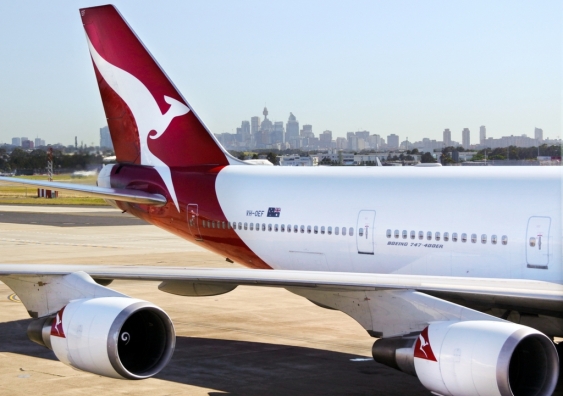With the evolving nature of the COVID-19 pandemic in Australia, the aviation industry continues to endure significant financial blows. This week, that reality intensified with the Australian government placing an advisory ban on international travel and more than 90 per cent of international flights having been suspended for a minimum of two months.
Qantas, Australia’s largest airline, announced today that it will temporarily stand down two-thirds of its 30,000 employees. The unprecedented move, reflecting the significant drop in travel demand, was a necessary one, says Tim Harcourt, JW Nevile Fellow at UNSW Business School.
“Qantas will have to make some adjustments to its labour force – but they should only be temporary,” he says.
“Qantas employees are very loyal to their company and their trust should be rewarded when they are hired back in recovery.”
The Australian government should consider public equity in Qantas as a public-private sector partnership, Mr Harcourt says, largely due to the significant role that Qantas has played in Australia’s aviation industry.
“We saw the public good element of Qantas during the bushfires and also during the current COVID-19 emergency when the company organised flights to bring back Australians who were stuck in Wuhan and Tokyo during the outbreak,” he says.
Qantas has been a part of the fabric of Australia for many years. Mr Harcourt reflected on Qantas’ history and how the aviation company used to provide a mail run for people living in Outback Queensland and the Northern Territory. In 1920, with only two aircraft, the company Queensland and Northern Territory Aerial Services (Q.A.N.T.A.S) was formed.
“Airlines are an essential service given Australia’s tyranny of distance both beyond our shores and within our island continent,” he says.
“For Australia, the airline industry is an essential service connecting the Outback to the towns and cities and linking Australia with the world. In our case of vast distances, coupled with a small population, it requires great capital and infrastructure.
“This means Qantas is part of Australia’s vital social and economic infrastructure and plays an important public good role for Australia.”
Following the steps of Qantas, Virgin Australia is also grounding all its international flights for the next two months and halving its domestic flights. Mr Harcourt notes that it is important that Virgin Australia stays in business to allow for consumer choice and competitive innovation.
What does this mean for the longevity of the Australian aviation industry?
The aviation industry is inherently a financially challenging one and is no stranger to bankruptcies. Aeroplanes are very expensive assets so reducing capacity during an economic downturn is tough.
The aviation industry is also particularly susceptible to external events and such as COVID-19 which prompted many countries to impose travel bans. The shutdown of borders globally coupled with low demand has significantly impacted the aviation industry, particularly in Australia.
“This is all about short term survival and cash flow. Provided the airlines can get through this temporary grounding, they will survive. Qantas has a healthy balance sheet and Virgin Australia has wealthy parents with deep pockets: Etihad Singapore Airlines and HNA,” Mr Harcourt says.
To help the aviation sector, the federal government has announced a $715 million aviation relief package which will waive regulation fees and charges during grounding.
“This is more efficient than a cash splash and acts more like a payroll tax reduction. It’s designed to get the airlines through the next few months of border closures.”
When will be the recovery period?
The aviation package is necessary to help Qantas, Virgin Australia and regional airline Rex, to get through the short run impact of COVID-19.
“We still don’t know how long the aviation grounding would last – some say a three to six-month period, others say for the rest of the year. However, we do know that when economic recovery comes, the airlines will bounce back quickly,” Mr Harcourt says.
“For years Australians have had to cope with the tyranny of distance and Qantas have helped us for 100 of those years. Now we must overcome the ‘tyranny of social distance’ to cope with COVID-19. We need to help Qantas.”

Tim Harcourt, UNSW Business School
Tim Harcourt is the JW Nevile Fellow at the UNSW Business School and hosts The Airport Economist TV series and The Airport Economist podcast. Qantas is the official airline partner of The Airport Economist TV series.



